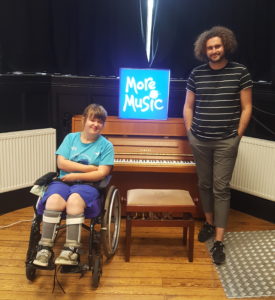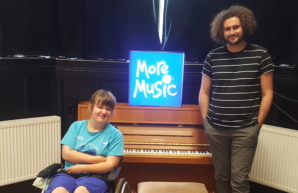Mentorship Scheme benefits two young musicians
Posted by Darren Leadsom on 02 September 2021
This year, we ran our first More Music Mentorship scheme, funded by Youth Music, which ran from January to July 2021. The aim was to provide a structured programme of shadowing, mentoring and training which gave mentees an overview of our diverse in-house programme and provided a hand-on insight into community music practice. Mentees were assigned a mentor from our core music leader team, who met with them regularly and arranged a timetable for when they could shadow up to 30 sessions across our weekly termtime programme. This included sessions for early years, SEND, young people and adults, exploring many different genres and styles of delivery. We provided a bursary for mentees to help fund their involvement, to lessen any financial barrier to participation.
We had aimed to start the scheme in September 2020, with mentees attending sessions in-person. The pandemic delayed us as initially our sessions were limited numbers and then they went back online following lockdown. Rather than wait for a return to ‘normality’ (as who knew when that would be), we thought it best to get started so we recruited a cohort to begin in January.
Rather than make it an open application, we decided to target local young people who had been through different parts of our youth programme over several years and who were ready for the next progression. Supporting young people from our own community seemed particularly important in the wake of the pandemic, where opportunities for them were greatly reduced and their own plans were had been impacted, such as progression into higher education or employment.
The two mentees were Jack Williams (who had come through Stages, our open music session for 12–18-year-olds, and Young Producers, our youth voice group) and Sarah Bayton (who was part of our Unique Beatz session, run at Unique Kidz in Morecambe which provides afterschool and holiday clubs for children and young people with disabilities). Unfortunately, a third mentee had to drop out early on due to personal reasons. They were mentored by our music leaders Rachel Parsons and Ash Murphy.
After a period of shadowing sessions (mainly on Zoom for the first term), the mentees were encouraged to deliver sessions themselves when they were back in person with limited numbers and apply what they had learnt. After seeing many different types of session, they were asked to focus on a particular type of session for the latter part of the mentorship, to give them more experience in the area they had found they were interested in. Both also took part in training sessions, where we shared and discussed the HEARD model of music inclusion and the Youth Music Quality Framework.
It’s been a unique year to run this mentorship. Delivering sessions online via Zoom was a new way of working for us and the methodology was developed through doing the sessions, learning as we went, which our mentees were able to witness and be a part of. Although it has not taken place in the way we originally planned, the mentees learned a lot from the experience. Running music projects online meant that they were able to witness more types of session, all from home so making them more accessible, so there were advantages. They also saw how important and integral it is to community music to be flexible in your approach to engage with participants.

Sarah Bayton and Jack Williams
After their final training session, I interviewed Jack and Sarah to find out what they felt about the experience:
Q: What has the experience of the mentorship been like for you?
Sarah: “The experience for me has been brilliant. I’ve enjoyed all the different sessions that I’ve been a part of remotely via Zoom but my favourite session has been the Clapping Song session where I got to experience working with young children.”
Jack: “The experience has been really varied in a good way because of the different challenges and having to adapt to the different situations I have been put in. It’s interesting to do this during the pandemic because it has made you develop different skills. Doing everything on Zoom for the first term has been interesting to grow alongside some of the sessions, to see how they have had to adapt. It really encompasses that ethos of accessibility and tailoring your sessions along with your participants. It felt like it really grew alongside with what they wanted to do. It was good to see the evolution of online delivery on the ground.”
Q: What new skills do you think you have gained?
Sarah: “I’ve learned that a good music leader needs to be committed to what they need to do and they need to be patient and to make sure that everybody in the sessions gets involved. I really enjoyed taking part in the ‘On The Beat’ session (aimed at adults with learning disabilities) as I had an opportunity to use my conducting skills and my signing.”
Jack: “I’ve learnt communication skills and workshop skills in general, teaching and understanding as well. Going into things understanding the different starting points of people and how best to tailor my experience and my practice to them. It’s made me gain new skills with different instruments as well. “
Q: What’s been a highlight for you?
Sarah: “The real highlight for me was doing the Clapping Song early years session and having that experience with young kids, it was absolutely superb.”
Jack: “A highlight for me has been Stages. Some of the skills I’ve learnt, such as doing workshops on drums has allowed me show kids in other groups how to do things and how to encourage a passion. One week I was getting bongos out for one of the kids who was interested in drumming to try and then the next week he comes with his own set of bongos, it’s so fun to see an encouraged passion there.”
Q: What do you think the next step is for you after this mentorship?
Sarah:” I would like to take some of my music experience to some of my friends back in Unique Kidz because I think most of my friends there are into music. I would like to take my music knowledge from this scheme into that.”
Jack: “Obviously I would like to stay involved here as much as possible and gain more experience with in-person workshop skills. I think community music is so important, I would like to carry forward the ethos of inclusivity and that way of making music to wherever I end up or sessions I create myself. It’s been such an important thing for me to be involved with and I’ve seen how important it is to participants, particularly through more recent times. I definitely want to carry this kind of work forward into other things I do.”
Our next step
We will plan for another cohort of this scheme in Year 4 of our Fund C programme. We will learn from the first cohort and decide if or how we want to change our approach to try and improve the scheme going forward. We are also looking into accessible instruments for Sarah to use to lead sessions independently.
Thanks to our mentees Sarah and Jack for all their hard work and dedication to the mentorship scheme. Thanks also to our music leader mentors Ash and Rachel for supporting them through the process and sharing their experience and expertise.
